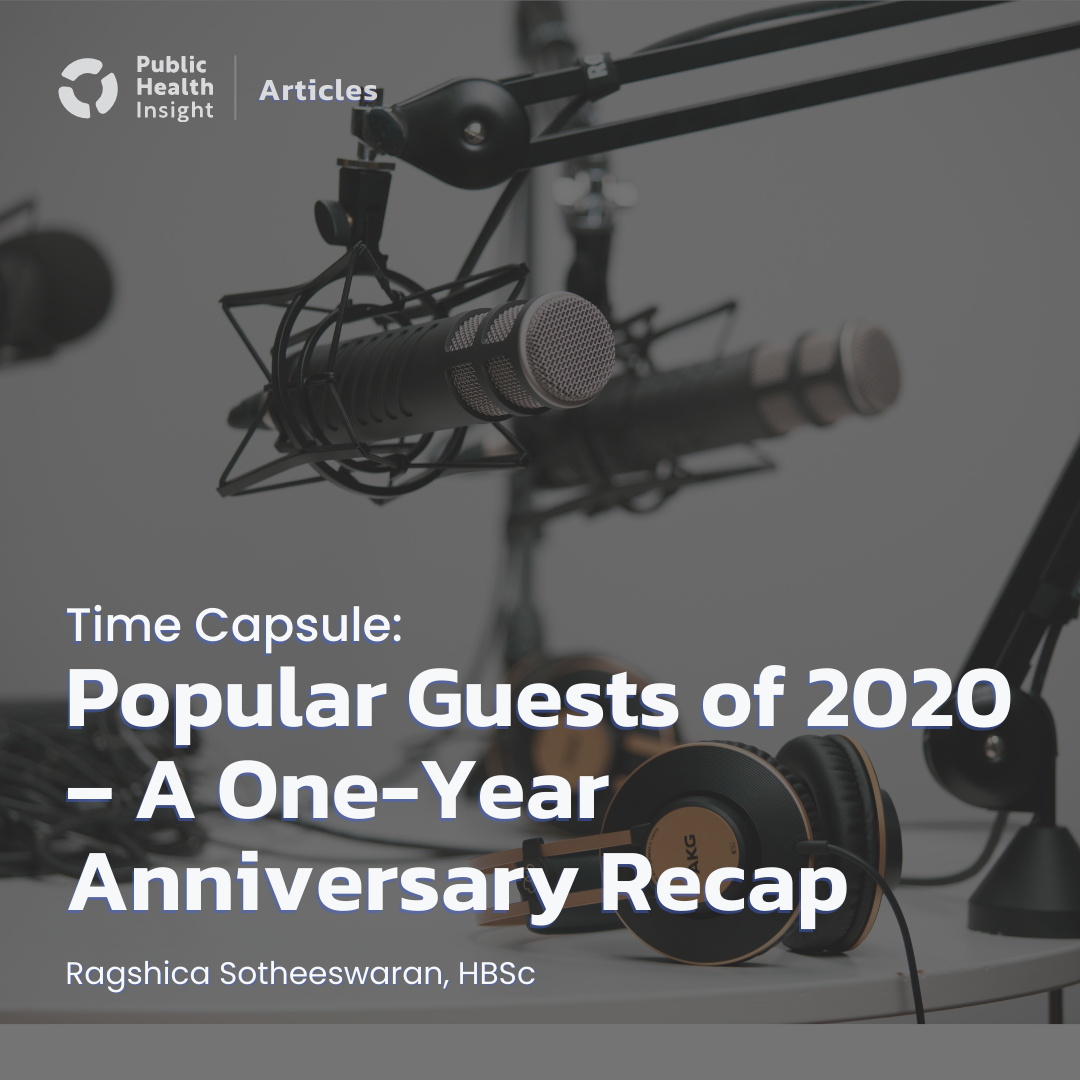
2/4/2022
It has been two years since Public Health Insight launched our podcast in March of 2020, and we are excited to celebrate this incredible milestone with our followers in over 1,500 cities in more than 100 countries, who have supported us along the way. We couldn’t have done it without you.
In celebration of the podcast’s second anniversary, we will be highlighting some of our favourite moments from our most popular guest episodes in 2020.
In Episode 6, Dr. Thane joined us to discuss some of the challenges for the healthcare system during the initial stages of the pandemic and some of the psychological impacts on healthcare workers. When asked about the competing interests of health and the economy, he stood out for his simple but eloquent answer.
“You can resurrect the economy. You cannot resurrect a person.”
In Episode 9, Dr. Fazel talked about the rapid propagation of misinformation on the internet and social media. He also explained how misinformation impedes the progress of important public health measures. When asked whether social media is our friend or enemy, he illustrated how social media is actually our ‘frenemy’.
“It’s a tool that can be used the right way or the wrong way. You can use a car to take your friends out to the mountains… and you can use a car to run over people… It’s how you use it.”
In Episode 11, Jessica joined us to discuss how the pandemic has impacted food security and food production, and how this affects our overall health. When asked about the current level of uptake of technology by workers in the agricultural industry, she highlighted the various ways technology is currently being used to support the industry then stated…
“Agriculture is a sector where there’s lots of room for growth with tech and advances, but it’s already started, the ball is already rolling.”
In Episode 22, Rose joined us to talk about the benefits of integrating cultural competency in the healthcare system. Using her own experience as an example, she explains the difficulties racial and ethnic minorities experience when navigating healthcare services, and states the need to address language as a barrier.
“The ideal of course would be that every provider or every facility would have interpreters but we know that’s not the case. So how do our healthcare systems better engage with their patients that have social and cultural differences?”
In Episode 24, Linda joined us to talk about the social determinants of health, exploring why they must be considered to improve the long-term health & wellbeing of individuals and populations. Linda brought on an interesting take to the social determinants by challenging the notion that race itself should be considered a determinant of health.
“It’s that structure of inequity and hierarchy that our society has created [that] is the determinant… Instead of pathologizing a race we [should] talk more about the system of inequity.”
In Episode 32, Nicole joined us to highlight education as an important determinant of health. After sharing her lived experience with the lack of diversity in post-secondary institutions, she noted current-day students still feel there is a lack of diversity on campus amongst faculty.
“It really does have an impact on the person’s experience on campus, [and] whether they get out on time or at all.”
In Episode 35, Rishawn & Praja joined us to talk about the importance of innovation in supporting caregivers of people with dementia. Rishawn walked us through an immersive exercise to contextualize the burden and the roller coaster of emotions caregivers often face.
“You feel relief, sadness, and pain all at once. The cost begin to pile up in your head… It’s all too much but you realize it’s not as much as what your father is living with. What he’s living with is dementia.” – Rishawn
In Episode 41, Tim joined us to discuss his childhood trauma, struggles with addiction, and pathway to recovery. Tim talked about how participating in triathlons, running, and meditation has served as an outlet for him to manage his bipolar diagnosis.
“For me tripolar was taking care of the mind, body, and spirit.”
In Episode 45, Dami, Danielle, and Lwam joined us to discuss the report co-authored by ETIO and Public Health Insight. The report highlights the ways in which the education system, social and economic system, justice system, and healthcare system contribute to disparities in Black communities in Ontario. They mentioned some ways in which people can join the fight against anti-Black racism.
“Educate yourself on the systemic issues i.e. read this report. Once you are empowered with the knowledge of this report take some action. Reach out to your local government, reach out to your provincial government and make yourself heard.”
In Episode 46, Samantha and Janel talk about their MPH journey, reflecting on what they have learned from their early career.
“We can see that public health is connected to all functions and sectors of society… I think there is a lot of potential to make huge strides in the health and wellbeing of communities if public health considerations is made a priority. ” – Samantha
Public Health Insight would like to thank our listeners for supporting us in the past two years. A special thank you to all guests for joining our podcast discussions!
We hope you enjoyed our 2020 recap of some of our favourite podcast guest moments. Follow us on social media to stay updated for new and inspiring content
Written by: Ragshica Sotheeswaran, HBSc